SI Vault: Remembering Chick Hearn, the Michelangelo of broadcasters

Editor's note: This story titled, "From High Above The Western Sideline," originally appeared in the April 9, 1984 issue of SPORTS ILLUSTRATED. SI.com is republishing the story to honor legendary broadcaster Chick Hearn, who called 3,388 consecutive Lakers games from 1965-2002 before passing away at 85. Today marks the 13-year anniversary of his death.
The radio hissed and emitted strange chuffing noises as it warmed up, then made a high-pitched meowing sound. Except for the phosphorescent glow of the radio dial, the room was completely dark.
...sshhhhhwopwopwop...is now stop-and-go all the way to the 605 interchange where there's a disabled...yeeeeoowooooo...but Mom Taylor's radio ministry cannot help you find Je-e-e-ezus without your prayers and your donations. Pray to God. Send the money to Mom...yeeeeeeeeeaaaaayuh...backed up all the way to the Harbor Freeway...rrrrrffffffzzzzzzzz....
The radio fluttered and woofed and then stammered crazily as if it were possessed by a demon that was trying to clear its throat. Then came a clear and resonant voice: "From high above the western sideline of the Los Angeles Forum, the world's most beautiful sports theater, hello again, everybody, this is Chick Hearn."
The voice was steady and sure of itself, and it caught the ear. The voice was made for radio, painting pictures in the dark. "Wow, what a tempo! Magic back and forth like a windshield wiper with the dribble drive, he throws up a prayer...air ball. Rebound left side taken by McAdoo, he goes right back up—a frozen rope that time, no arch, but it melted right in the hole. Phoenix Suns down by one with a minute left in the half, and it's so quiet in here that when this game's over they may have to send the ushers around and shake some of the customers. Walter Davis gives to Lucas in the lane. Lucas fakes and puts James Worthy deep into the popcorn machine. He's covered with salt. Lucas' shot spins around like a motorcycle in a motordrome...oh, heartbreak."
• MORE VAULT: Hearn giving networks run for their adjectives (03.29.71)
From the beginning the voice had about it a musicality that was perfect for basketball—soaring half notes gliding toward the basket, fast breaks in syncopated rhythm. "If you're going to capture the beauty of the game," says Eddie Doucette, who has broadcast Milwaukee Bucks games since 1968, "you have to be as fast as it is. And in order to do that, you can't miss the beat of the ball. Chick Hearn is probably the best there's ever been at making you hear the beat of the ball."
Hearn has been the Voice of the Los Angeles Lakers for 24 seasons and nearly 2,000 broadcasts, an incumbency during which he perfected the simulcast—describing a game on radio and television simultaneously—and practically invented professional basketball in Southern California. He gave the game a language of its own and, in the process, has become, at the age of 67 or thereabouts (Hearn isn't telling), one of the sport's enduring institutions. (Apart from pro basketball, Hearn over the years has broadcast college basketball, college and professional football, track and field, major league soccer, auto racing, horse racing, boxing—"It might be my best sport," he says—golf, tennis, swimming, bowling and water polo.)
Lakers resist nostalgia and embrace the future with D'Angelo Russell
"For kids of my generation growing up in Los Angeles, Chick was an almost mythic figure," says Lyle Spencer, 35, who covers the Lakers for The Los Angeles Herald Examiner. "At that time it was Elgin Baylor, Jerry West and Chick, and they were all of about equal importance. Chick had such a powerful voice, and his images were so vivid. Radio forced you to use your imagination and to participate, and I think that's why Chick affected so many people. It was just you, Chick and his words. He immersed you in everything about the Lakers. If you listened to him you had no choice but to care. It's all so important to him. If Chick were ever forced to give up the Laker broadcasts, he would cease to exist."
It is 6:30 on a mid-January evening, two hours before the start of a game between the Lakers and the Seattle Super Sonics, and Hearn has been busy preparing for his broadcast for nearly an hour. Sitting alone at his front perch in the Forum's upper press box, Hearn tends his statistics in this deserted aerie like some Himalayan yakherd. "Through all the years, no matter what kind of problems Chick may have had," says West, now the team's general manager, "when that bright light comes on, he's ready. I wish some of our players prepared for the games as well as he does."
Through his statistical studies, Hearn almost invariably mines some numerical nugget for the gold in it. The most celebrated instance of this occurred during the early 1970s when Happy Hairston was playing forward for the Lakers. Hearn's pregame research turned up the fact that Hairston had gone something like five full quarters without scoring a field goal. During the game that night Hearn mentioned Hairston's long dry spell early in the broadcast; then, as the minutes rolled by and Hairston still hadn't scored, Hearn gave regular updates on the drought. As Hairston's scoreless streak passed the 90-minute mark, Hearn began a minute-by-minute countdown to 100. This didn't go unnoticed in the Forum, where it has long been fashionable to monitor Hearn while watching the game at hand. When Hairston unhappily reached 100 scoreless minutes, the Forum practically exploded. Hairston, who was playing with a leg injury and, moreover, had had no idea what was going on, talked for a while of suing Hearn, but eventually he decided to drop the idea.
Preparation obviously helps make Hearn a superior announcer, but it also serves to pass the time between games, especially on the road, where waiting has always been an ordeal for him. "The worst part is the day of a game," he says. "I finish my work by noon, so what am I going to do for six hours before a game in Phoenix? It's a terrible thing to say in my business, but I don't watch TV. So I read or do a crossword puzzle and I walk around, and then finally it's time to go to the game." When he arrives at his broadcast position he continues to prepare. "I'll sit there by myself and maybe do a quarter just to warm up," Hearn says. As the maintenance men and the technicians scuttle crablike around the arena floor, Hearn begins to make bodies whirl about in his mind, and slowly his vocal chords begin to resonate with the beat of a ball that only he can see.
GALLERY: Iconic Los Angeles Lakers photos over the years
Iconic Lakers Photos
Dick Schnittker
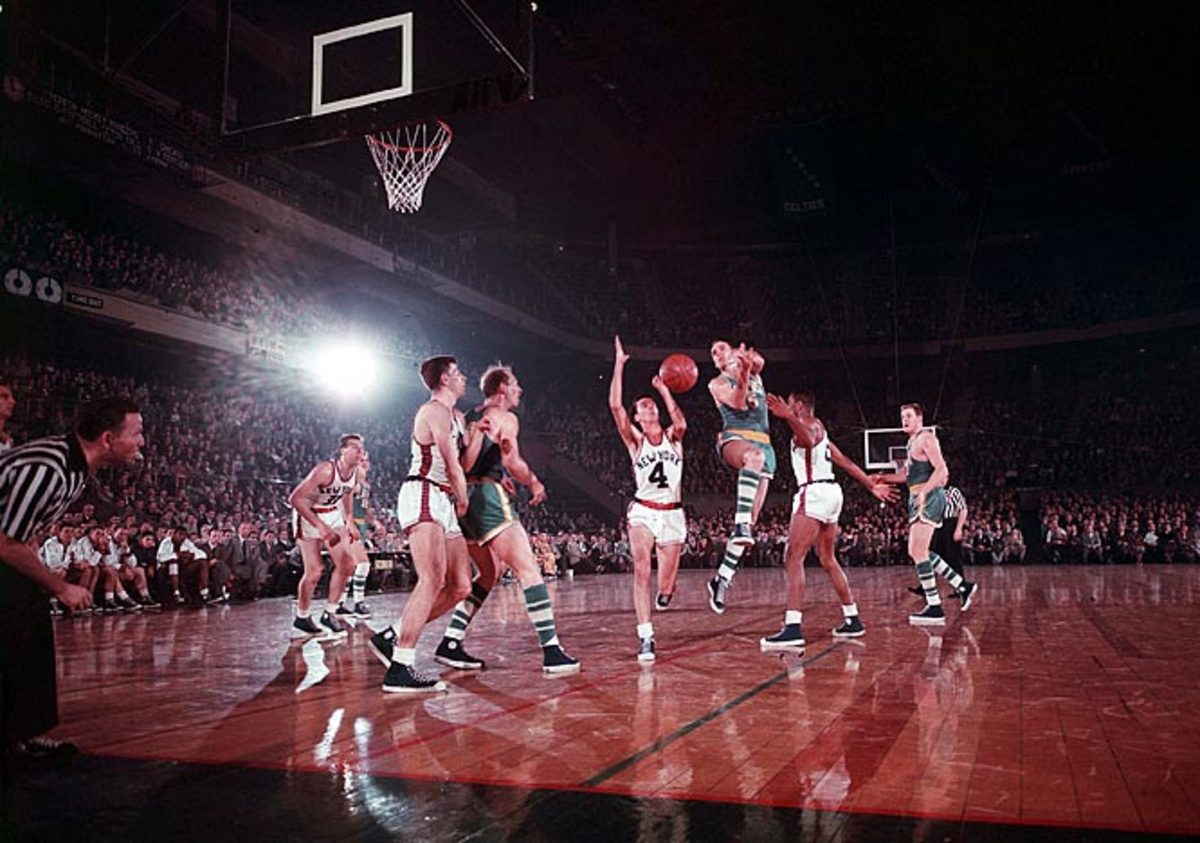
Minneapolis Lakers forward Dick Schnittker squeezes a pass by Carl Braun (No. 4) during a game against the Knicks.
Ed Kalafat, Harry Gallatin and Clyde Lovelette
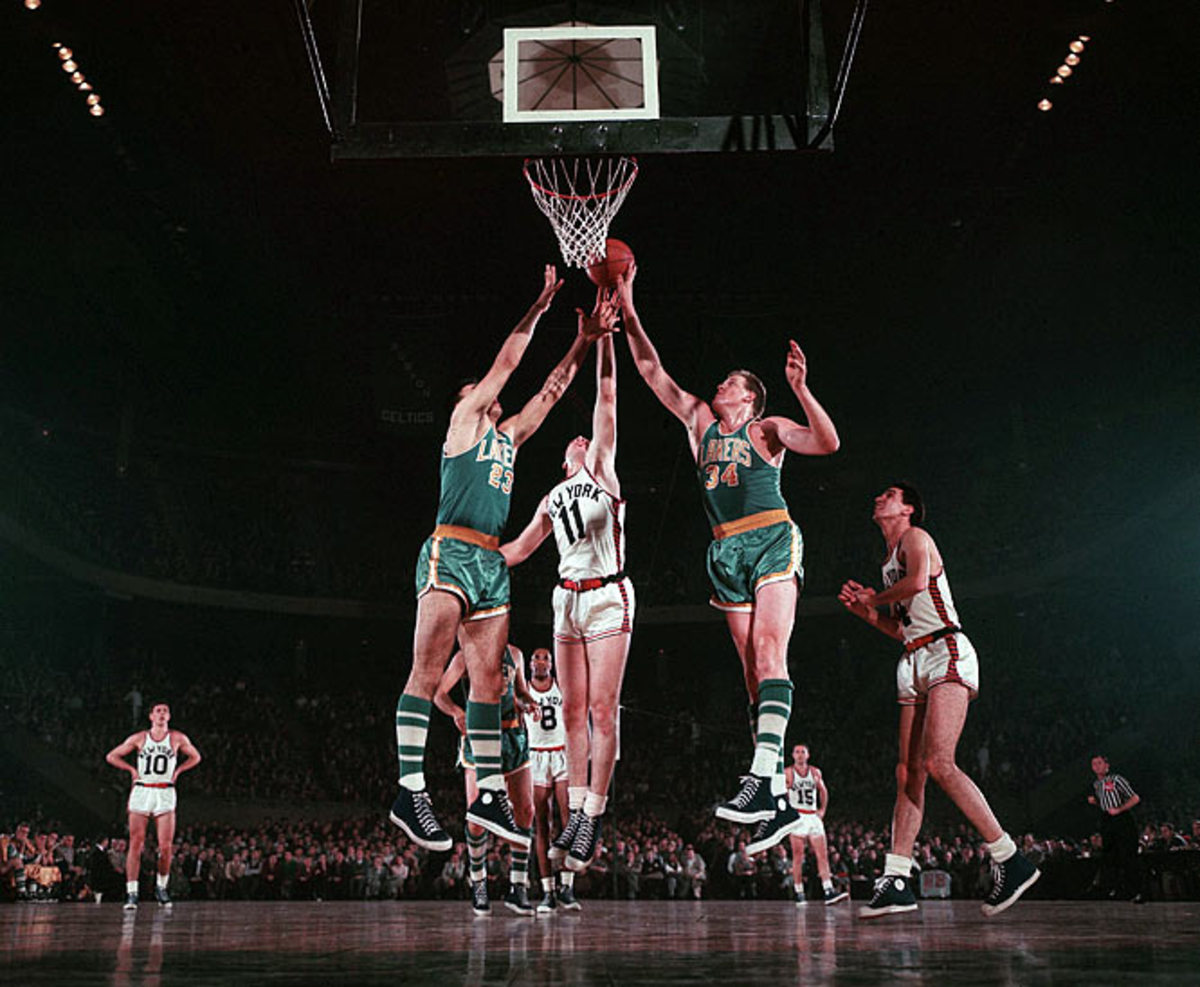
Ed Kalafat (No. 23) and Clyde Lovelette (No. 34) attempt to reject a shot taken by New York center Harry Gallatin (No. 11).
Vern Mikkelsen and Ed Macauley
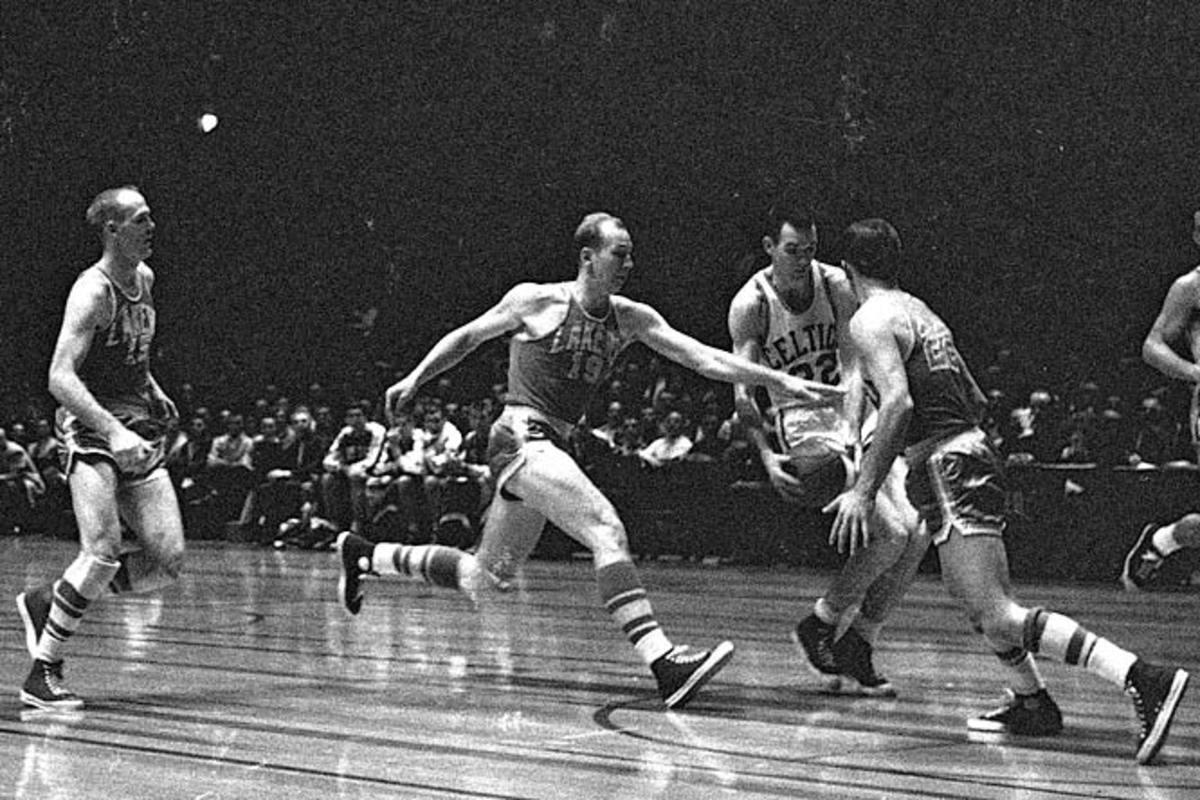
Boston's Ed Macauley (No. 22) glides past Vern Mikkelsen (No. 19) during a Celtics-Lakers game.
Wilt Chamberlain, Jerry Lucas and Phil Jackson
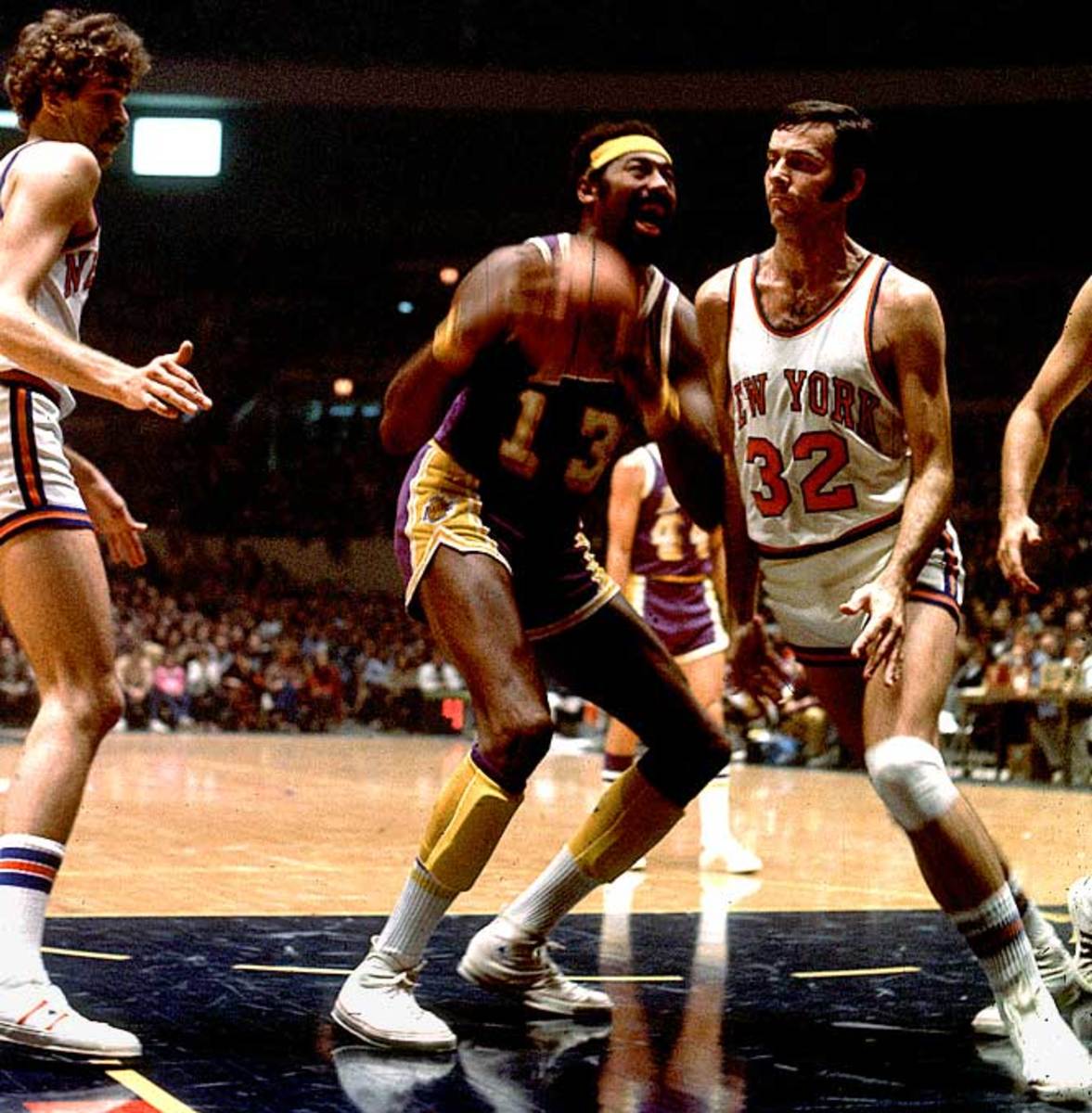
New York's Jerry Lucas (No. 32) leans on Wilt Chamberlain as the Lakers' center goes up for a dunk. To the left is former Knick and current Lakers coach Phil Jackson.
Wilt Chamberlain
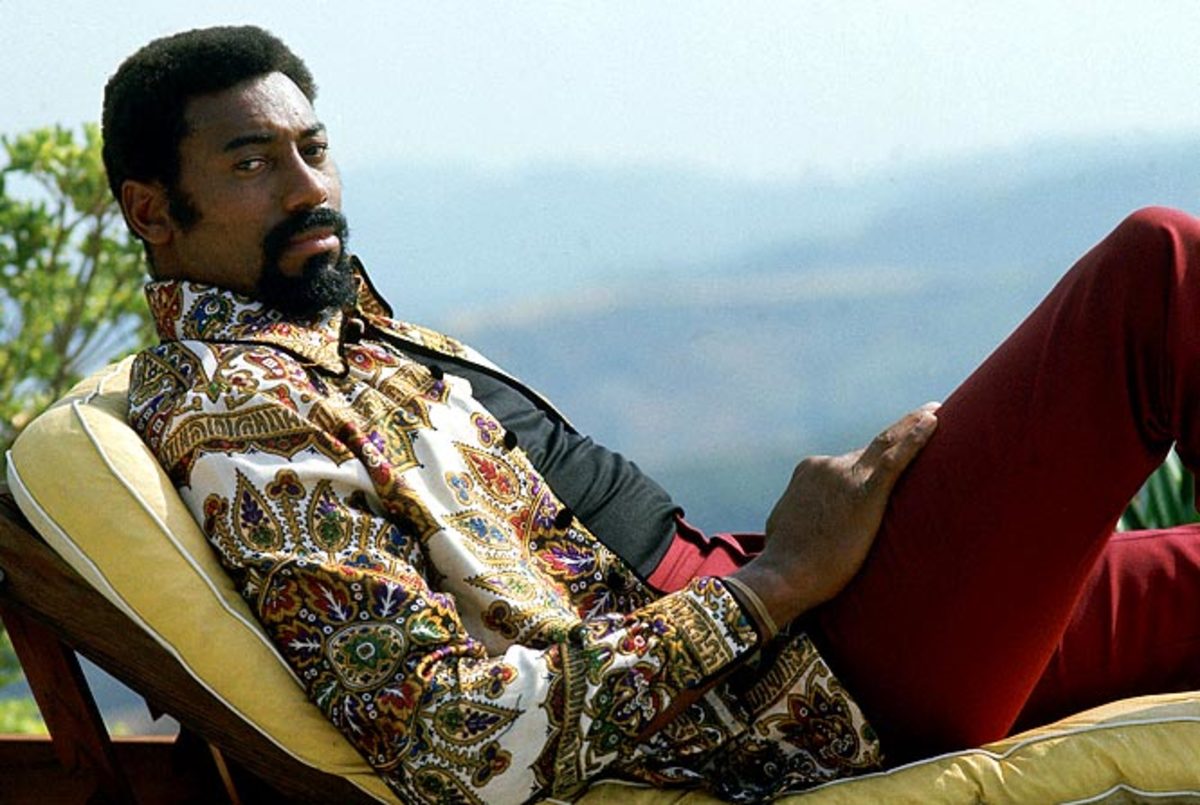
Lakers center Wilt Chamberlain relaxes in Los Angeles.
Pat Riley
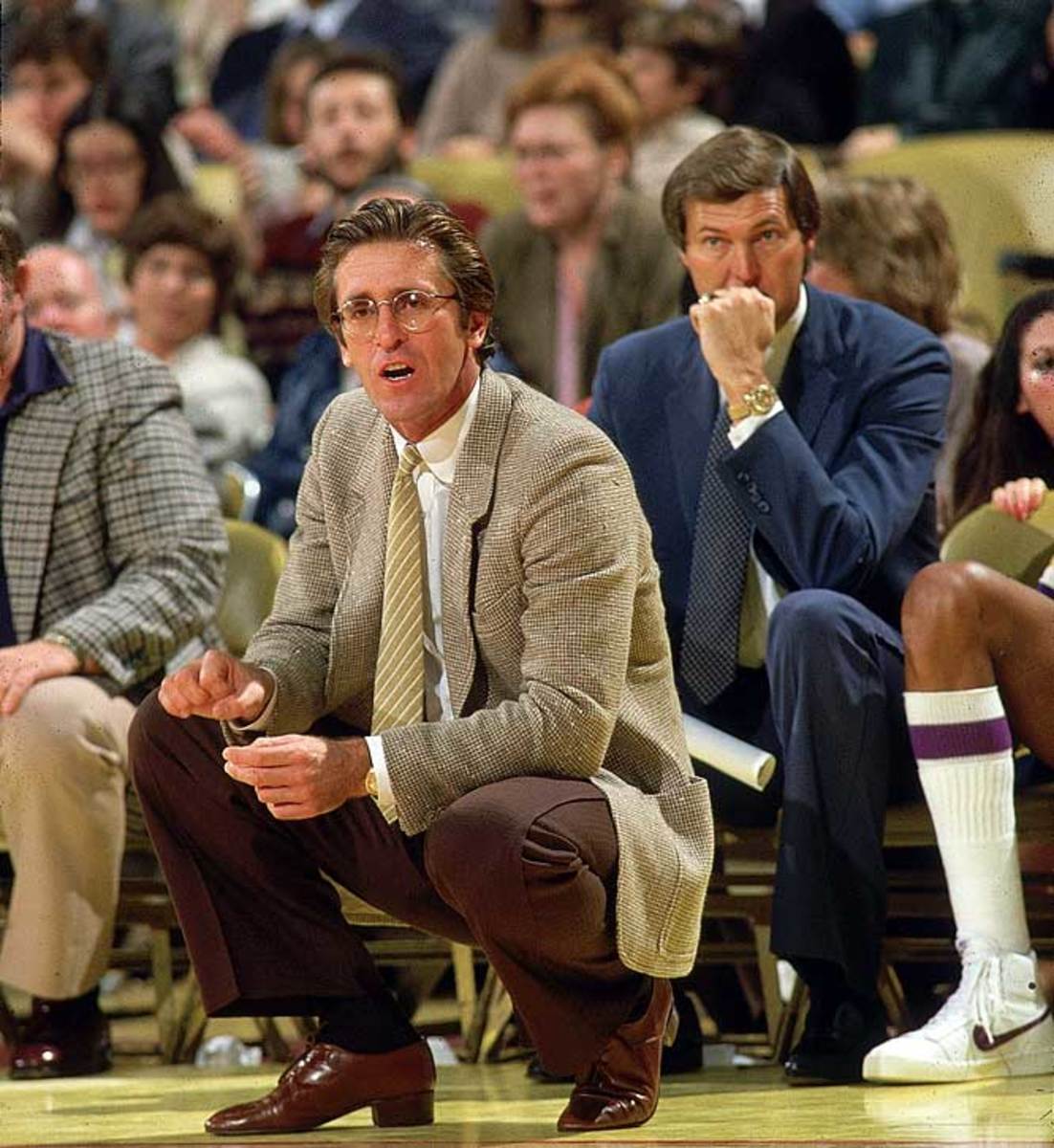
Lakers head coach Pat Riley and assistant coach Jerry West take in the action.
Larry Bird and Magic Johnson
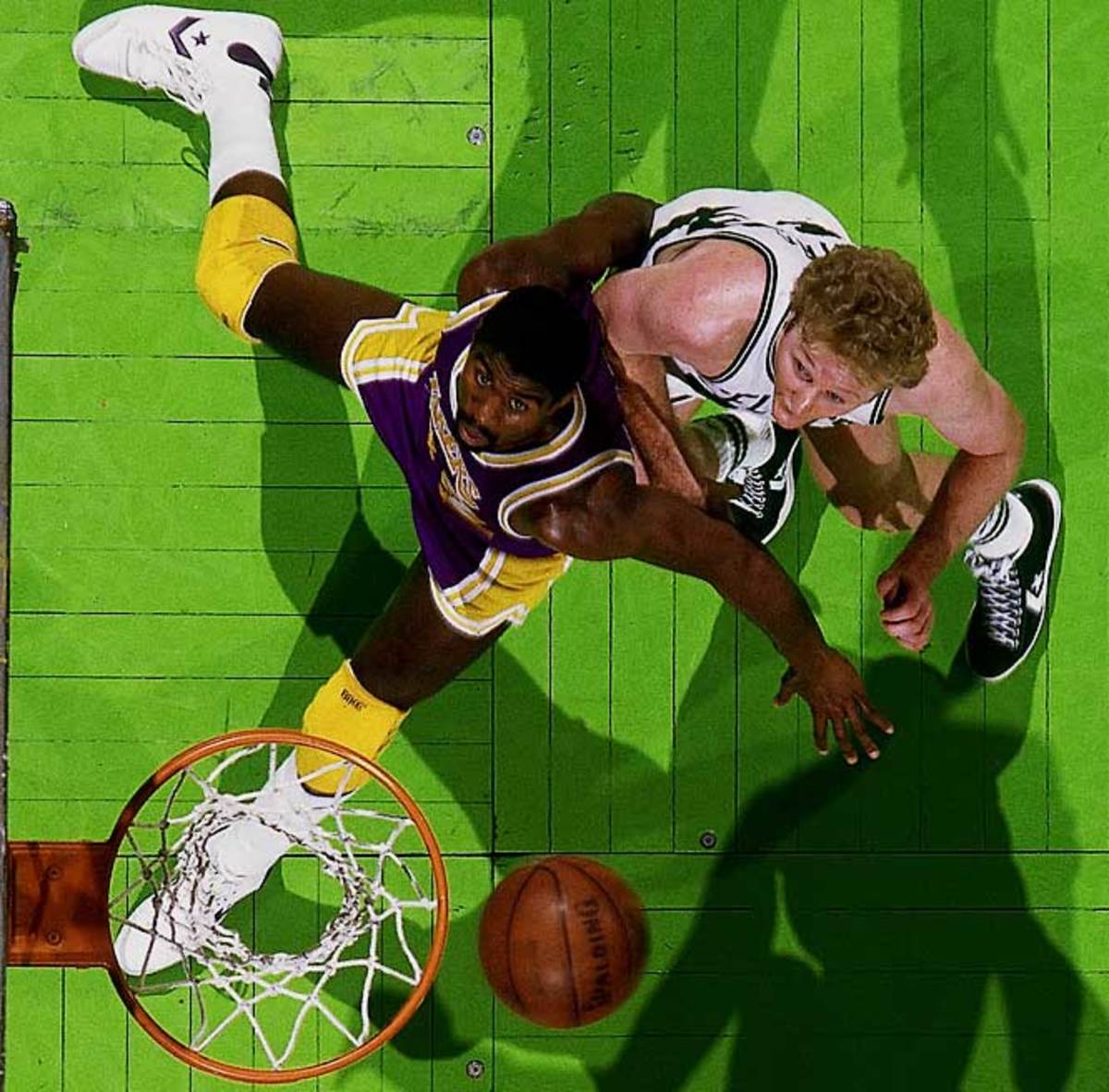
Longtime rivals Magic Johnson and Larry Bird battle for a rebound.
Magic Johnson and Kareem Abdul-Jabbar
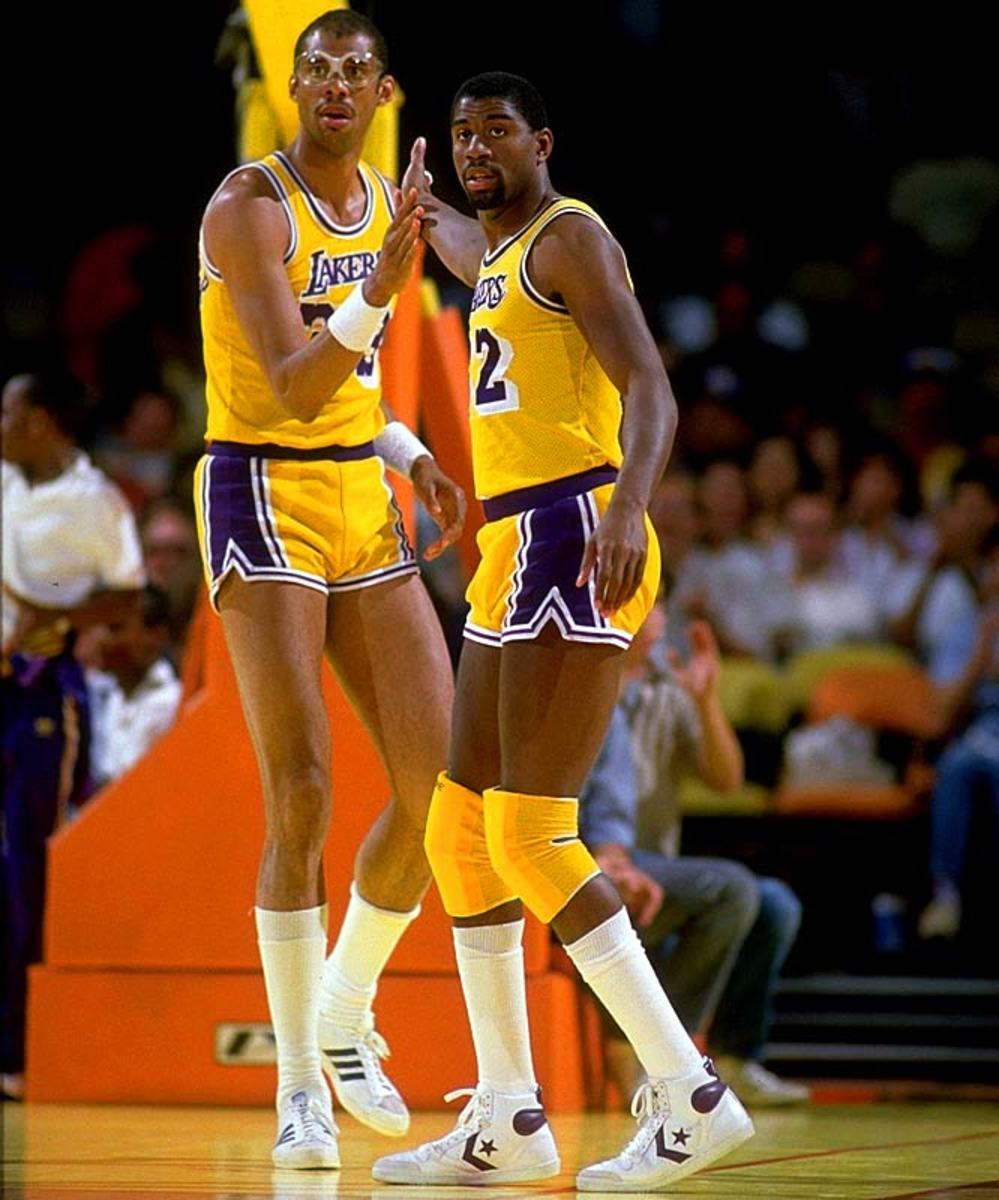
Magic Johnson and Kareem Abdul-Jabbar exchange a high five during a game against Portland.
Kurt Rambis
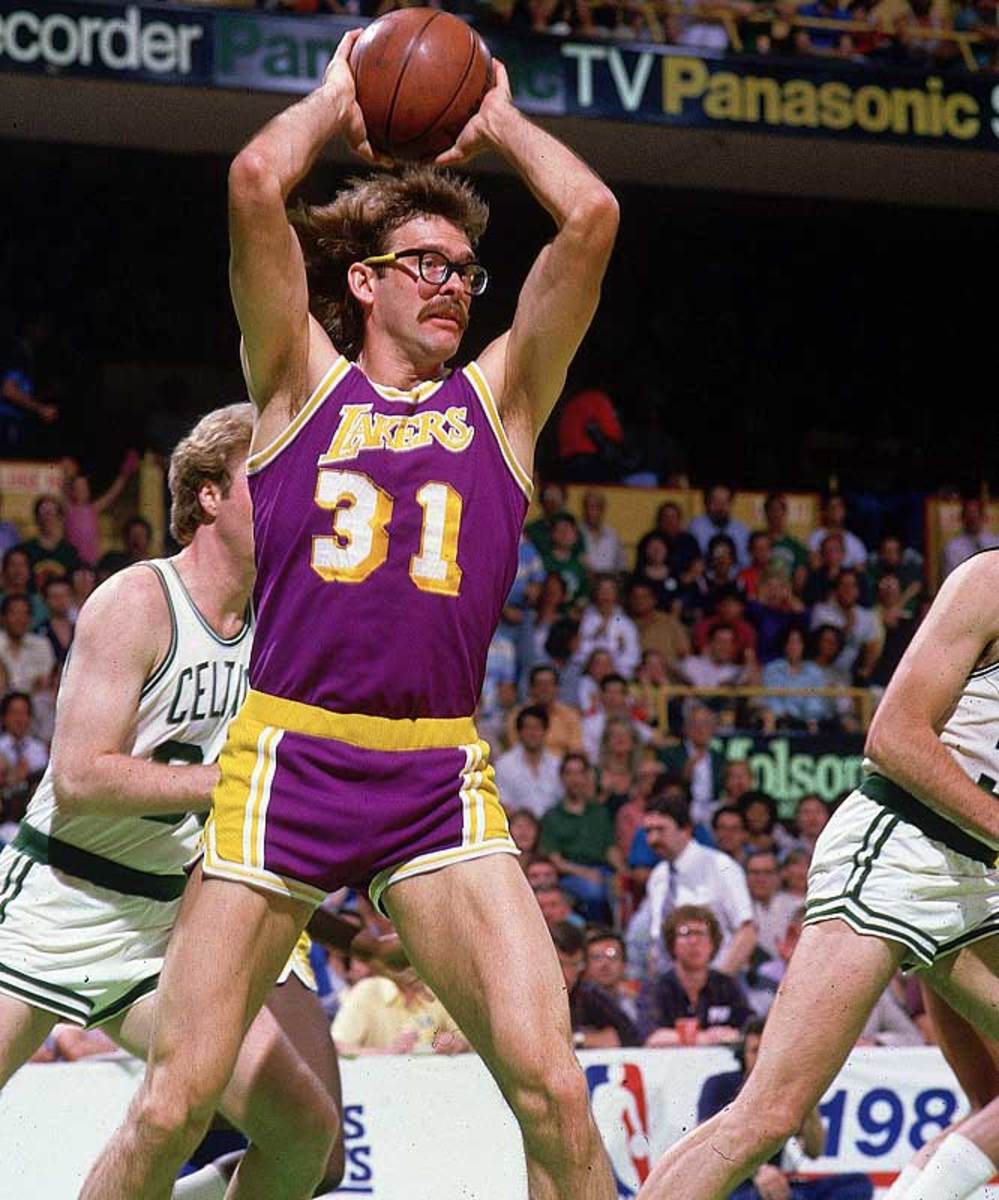
Former Laker forward and current assistant coach Kurt Rambis looks for an outlet pass during Game 1 of the NBA Finals.
Danny Ainge, Magic Johnson and Larry Bird

Magic Johnson and Danny Ainge argue while Larry Bird plays the role of peacemaker during a heated moment in the NBA Finals.
Magic Johnson

Magic Johnson glides past Dennis Johnson during a Celtics-Lakers regular season matchup.
Los Angeles Lakers
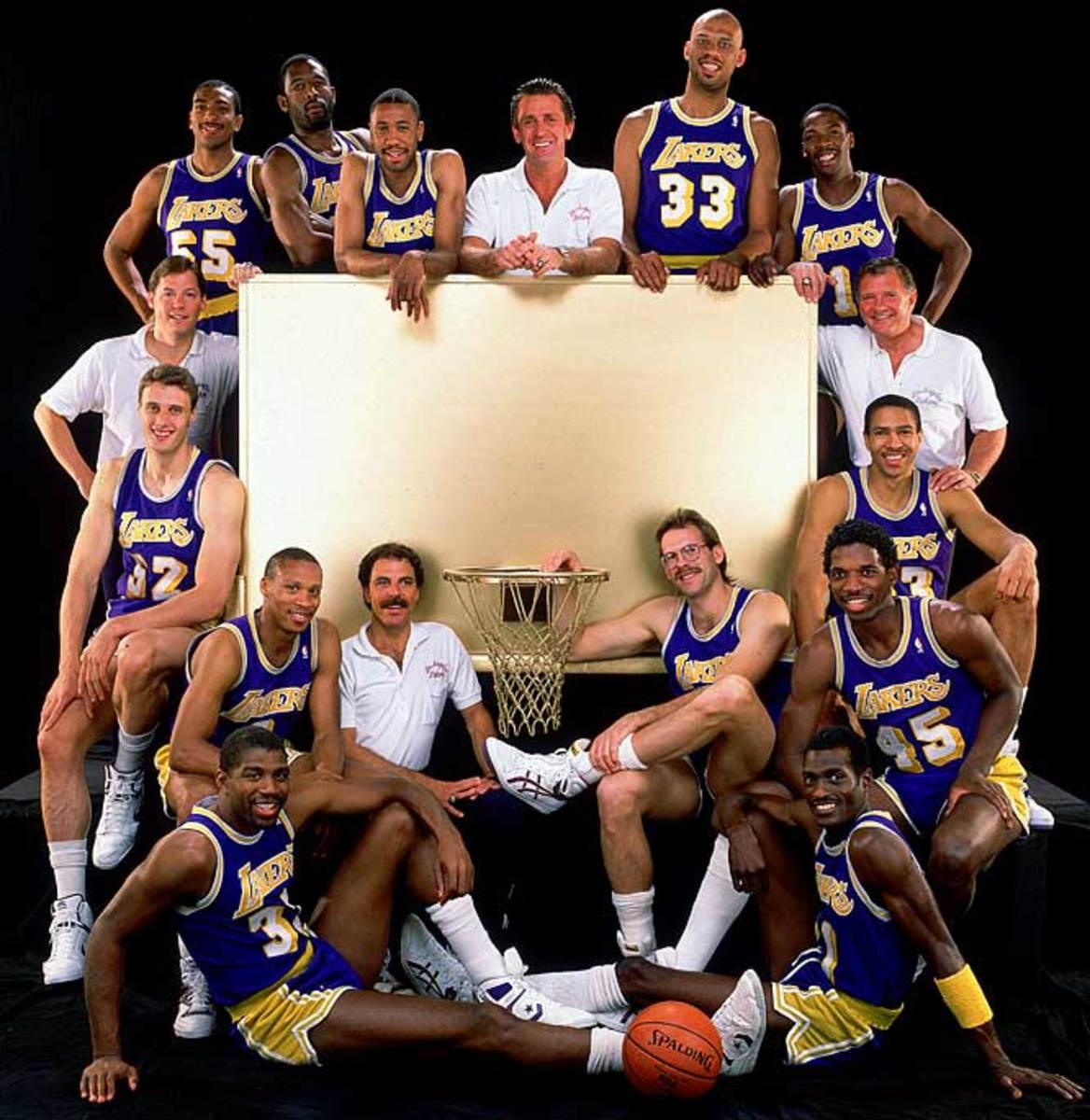
The 1988 Los Angeles Lakers pose for a team photo.
Magic Johnson and Michael Jordan
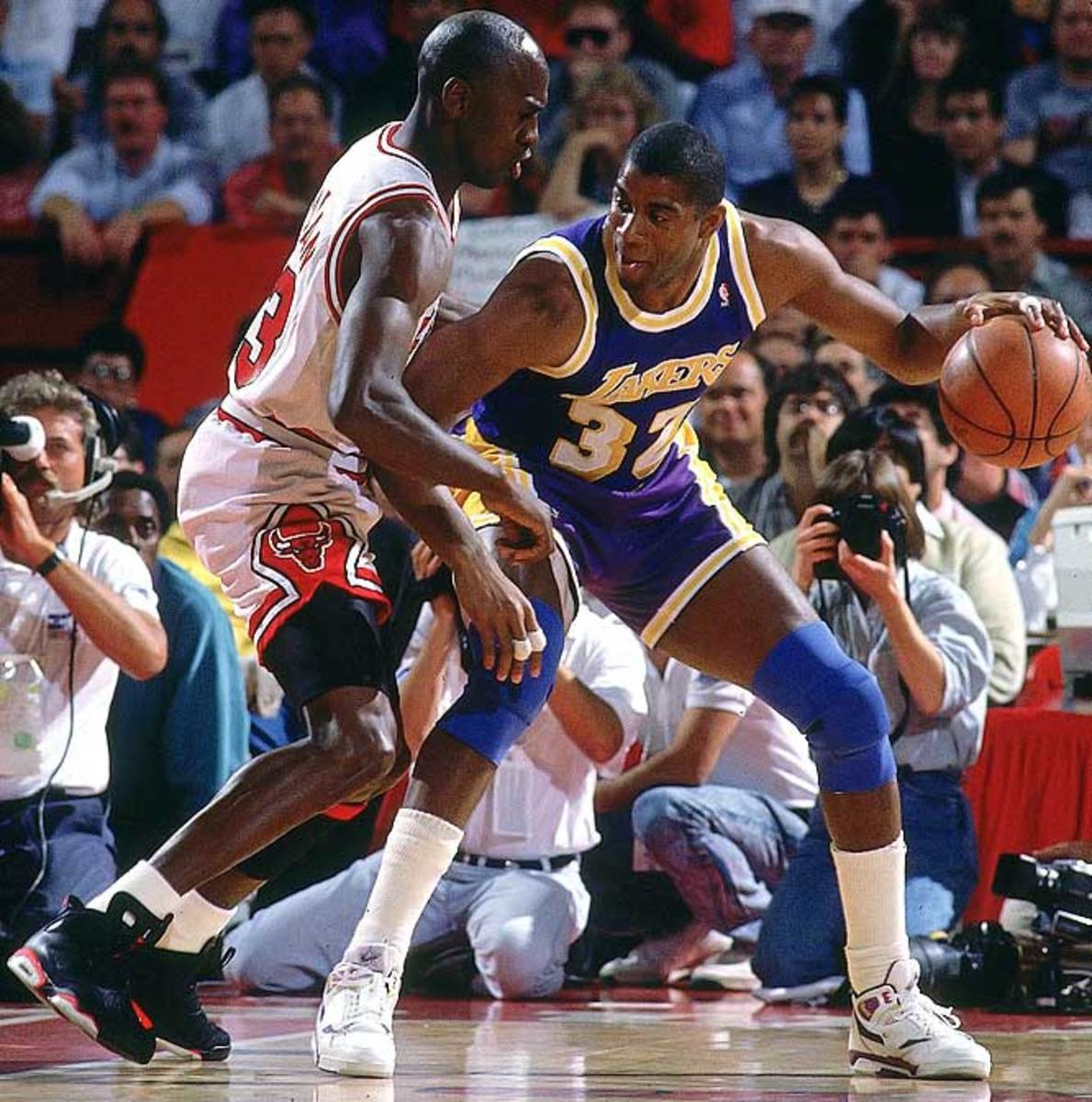
Magic Johnson posts up Michael Jordan during Game 2 of the NBA Finals.
Kareem Abdul-Jabbar, Shaquille O'Neal and George Mikan

Famous Laker centers Kareem Abdul-Jabbar, Shaquille O'Neal and George Mikan pose for an SI photo shoot.
Phil Jackson
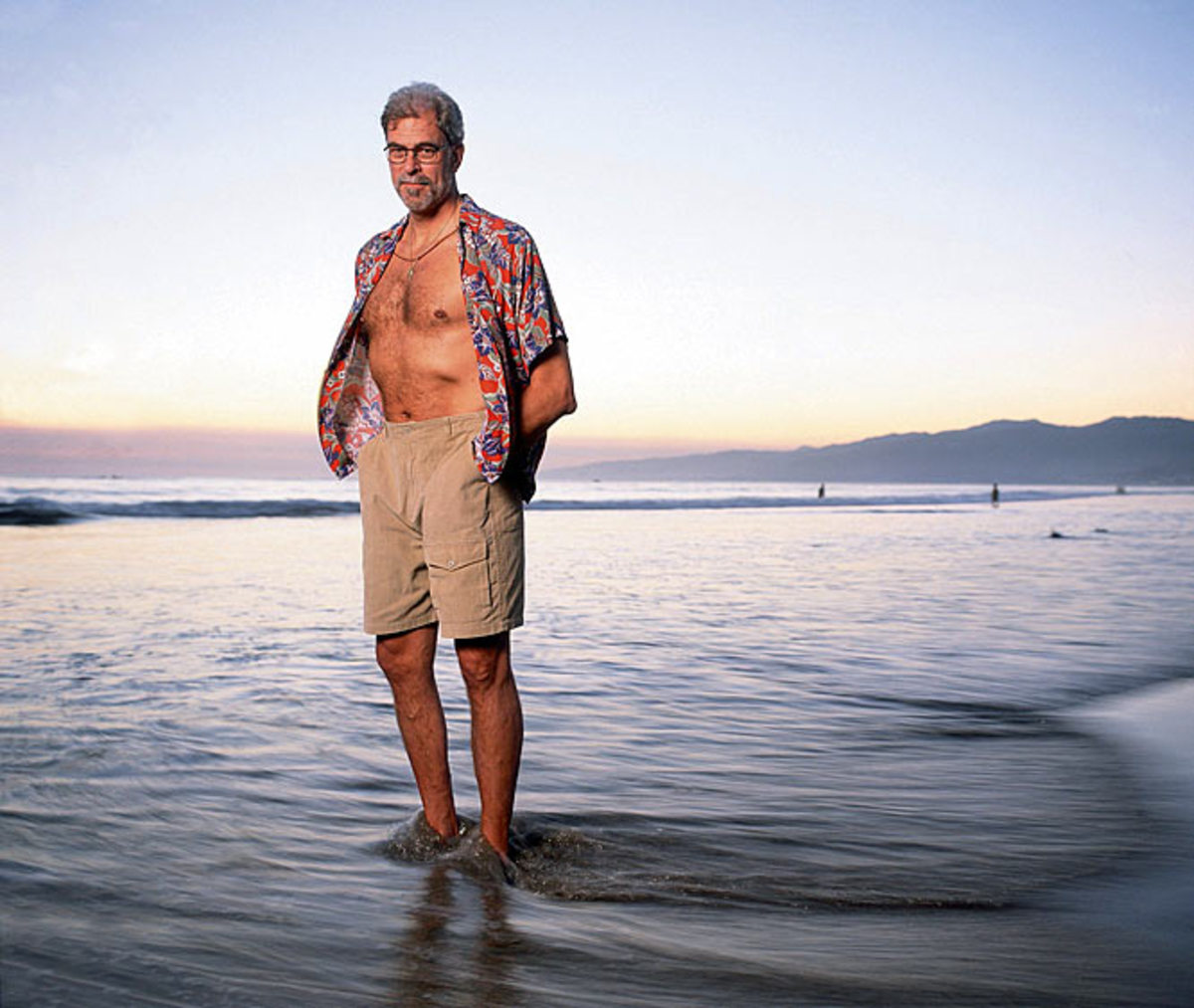
Big Chief Triangle himself, Phil Jackson, unwinds on the beach.
Kobe Bryant

Kobe Bryant celebrates his second championship after the Lakers beat the Sixers in five games.
Rick Fox
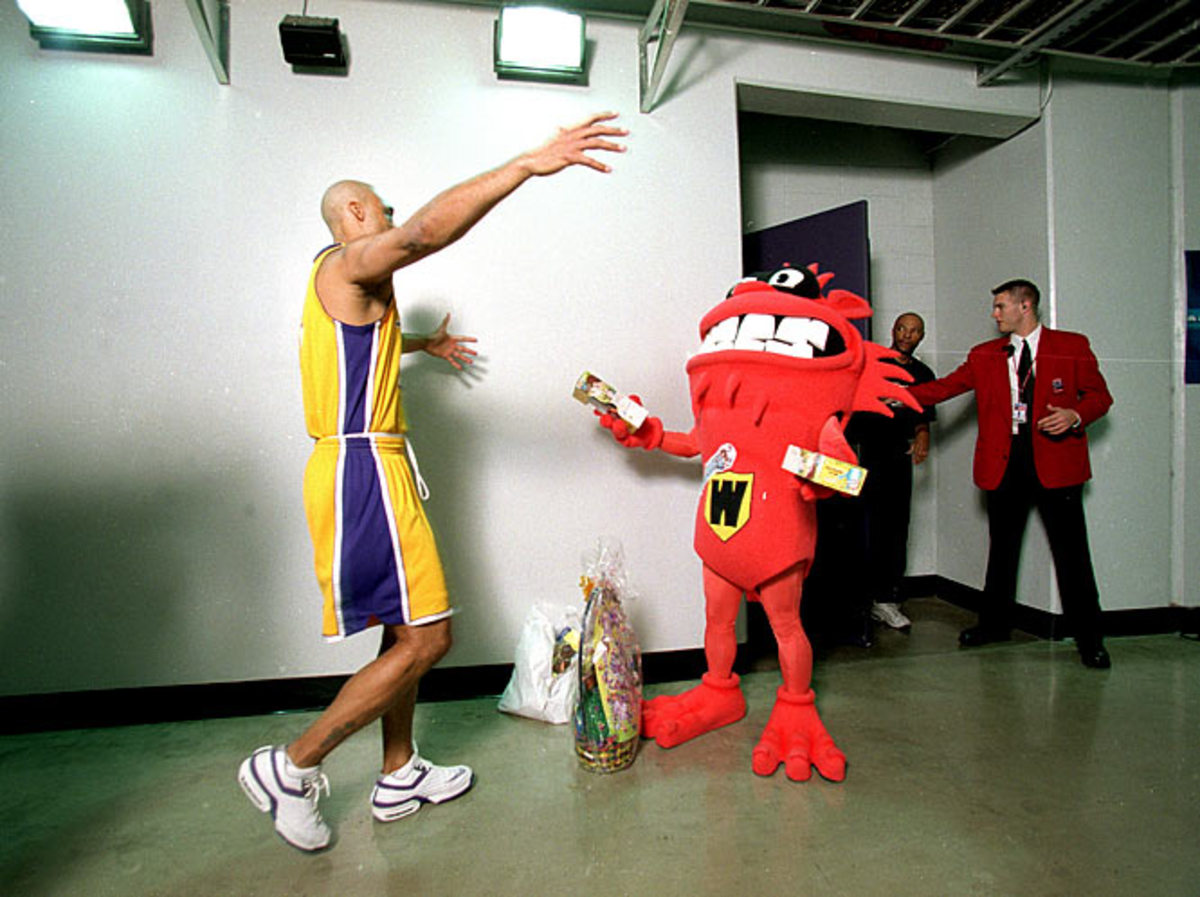
Rick Fox gets ready to hug the "Whammy" as he makes his way back to the locker room.
Kobe Bryant

Kobe Bryant admires himself in the players' lounge prior to a game against Washington.
Robert Horry
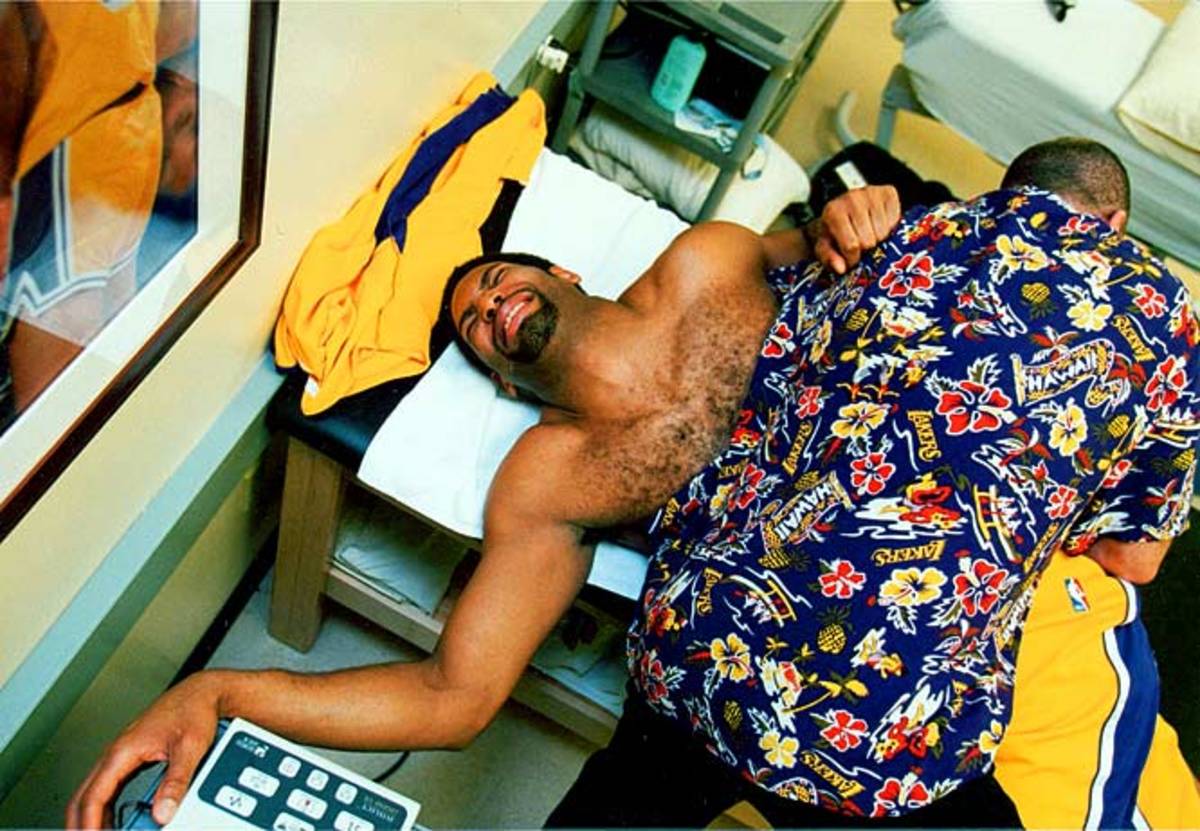
Robert Horry gets stretched by head trainer Gary Vitti prior to a game.
Jerry Buss
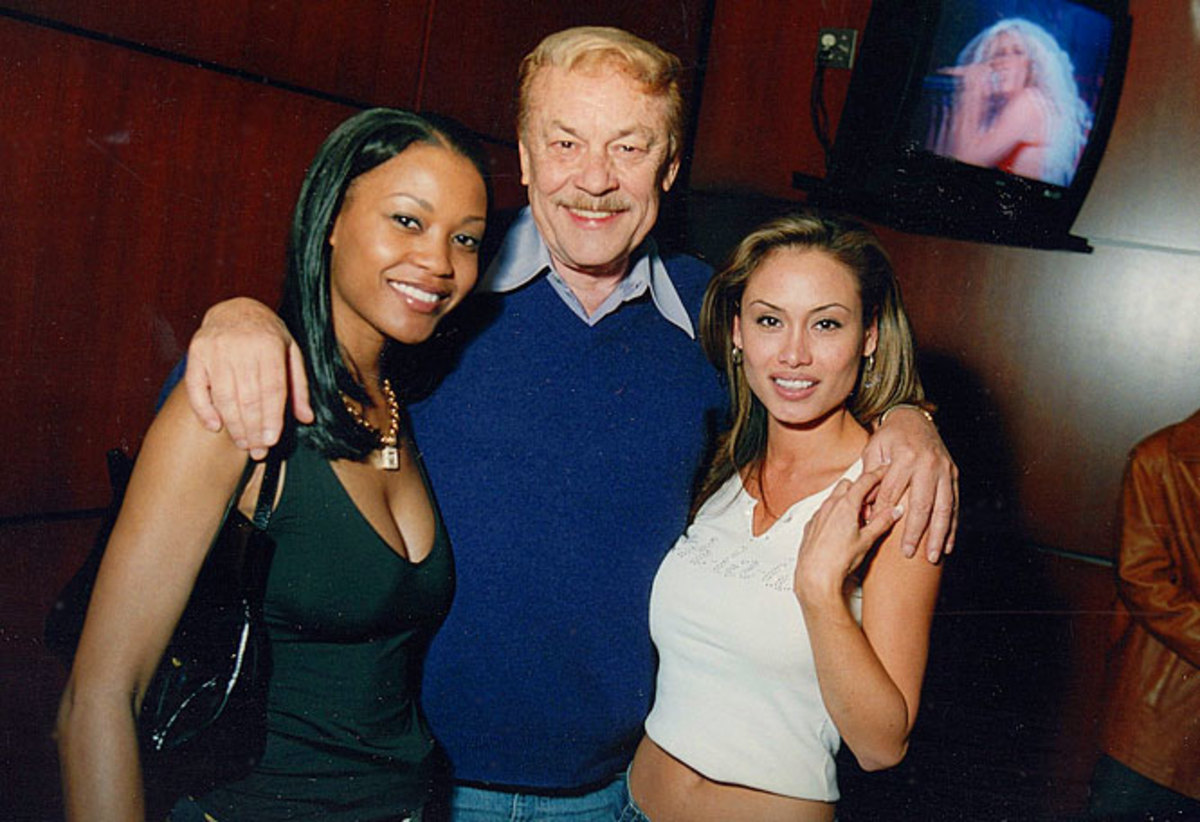
Lakers owner Jerry Buss relaxes with some Laker fans.
Shaquille O'Neal
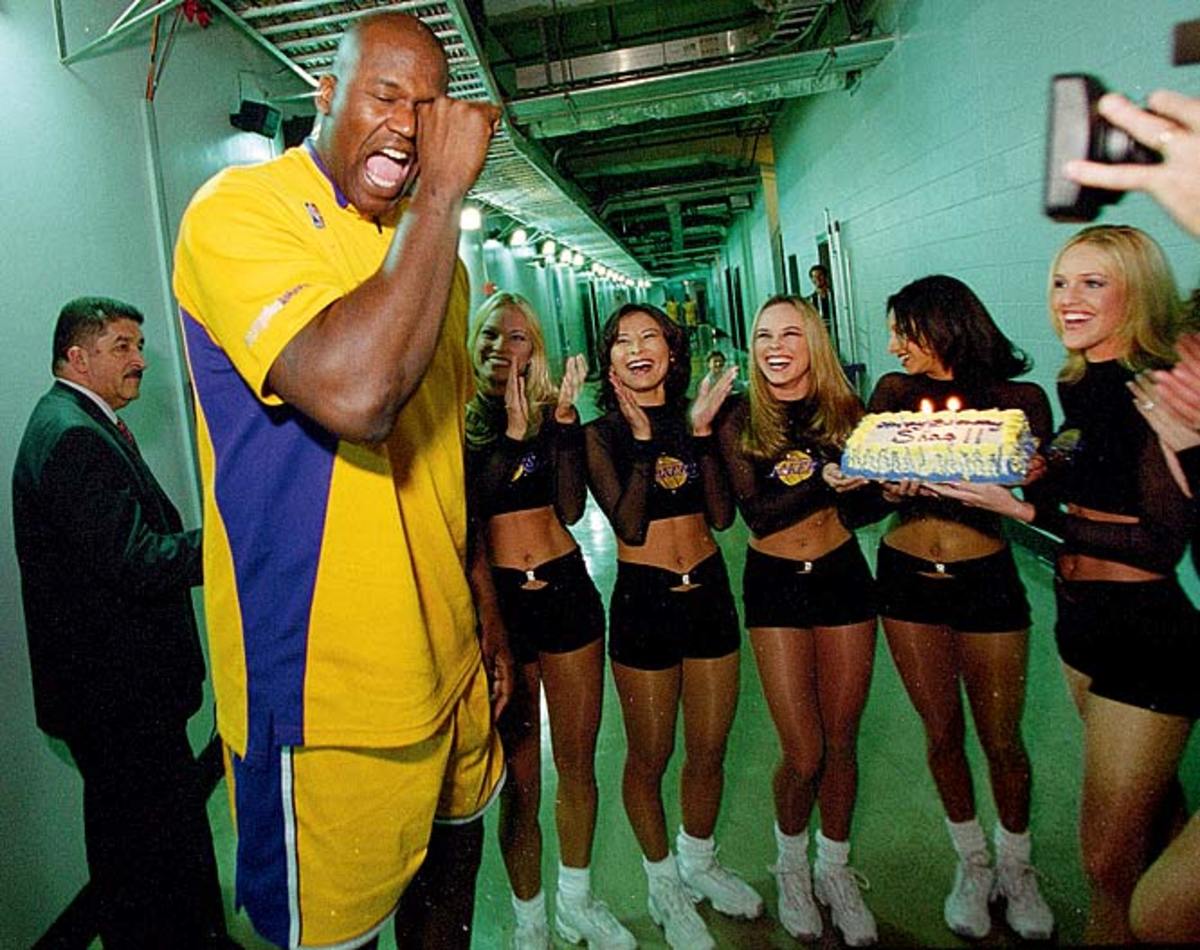
Shaquille O'Neal fakes crying after being presented with a 30th birthday cake from the Laker Girls.
Kobe Bryant
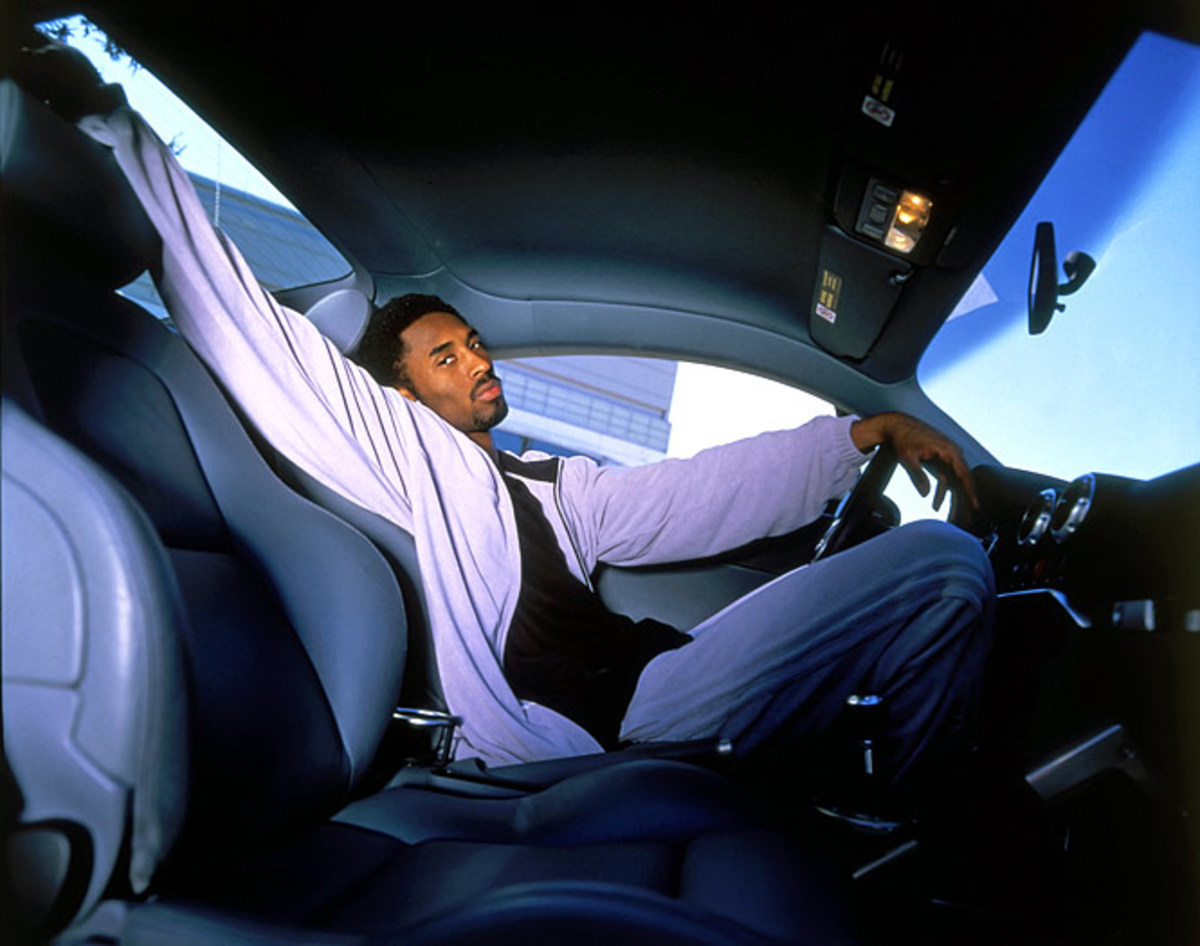
Kobe Bryant shows off his ride.
Shaquille O'Neal

Shaquille O'Neal catches some sleep on the team's charter plane.
Kobe Bryant

Kobe Bryant is a huge hit wherever he goes, even in a McDonalds.
Phil Jackson and Jeanie Buss
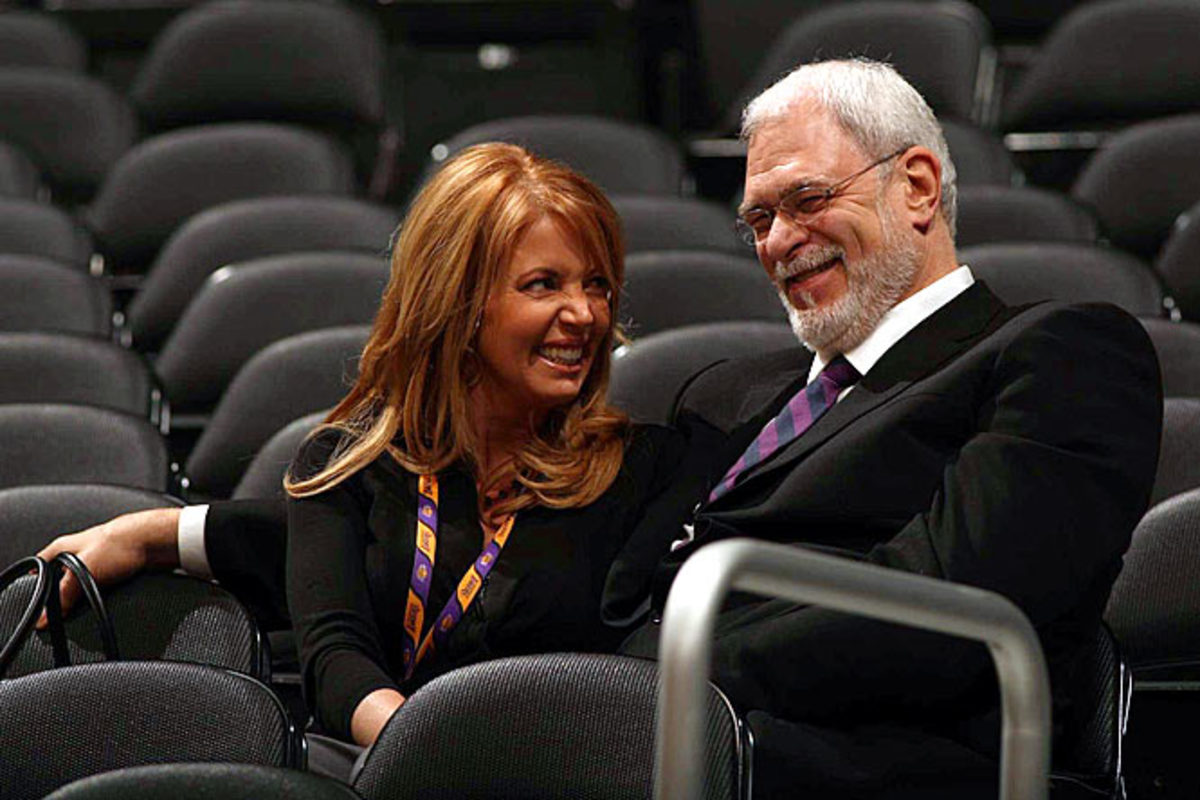
Phil Jackson enjoys a moment with Executive Vice President of Business Operations Jeanie Buss during an off-day in 2008.
As might be expected of one so set in his ways, Hearn has never taken kindly to sharing his air time. In fact, he worked alone until 1967 and was the last play-by-play man in the NBA to give in to a color man.
"Chick was the kind of guy who would never give his color men a whole lot of rope—usually just enough for them to hang themselves," says Laker coach Pat Riley, who worked with Hearn from 1977 to '79 before becoming Paul Westhead's assistant coach. "If you're sitting beside him, you'd better be ready, because Chick tests you on the air."
When Westhead first offered him the chance to be an assistant coach, Riley resisted. "I didn't want to do it," he says, "but Chick highly recommended that I give it my best shot. Maybe he saw something in me that I didn't see. All I know is that if Chick hadn't advised me to take the coaching job, I wouldn't have done it." When Westhead was fired, Riley patterned himself not after Jack Ramsay or Dick Motta or any other coach, but after Hearn. Riley's Laker teams quickly became known around the league for their detailed preparation. "I think a lot of what I do now comes from watching Chick prepare for a broadcast," Riley says.
Like most of his predecessors as Hearn's sidekick, Riley generally felt the safest course to steer with Hearn was to agree with him on the air as often as possible. Hot Rod Hundley, the Utah Jazz announcer, who worked with Hearn from 1967 to '69, says, "You can say, 'That's right, Chick,' as many times as you want. But if you say, 'That's wrong. Chick,' you're gone." Usually there wasn't much to correct Hearn about anyway. "Chick's work is the Lakers, and his life is the Lakers," says West. "When I turn on the radio, I can tell by the tone of his voice whether we're winning or losing." When things aren't going just right, Hearn becomes what one of his admirers calls "the walking, talking nervous breakdown," but when everything's just fine, watch out. Riley remembers watching Hearn after several memorable Laker rallies at the Forum, Hearn rising majestically out of his seat as the noise swelled to a deafening level. Slowly he would raise his arms until the cheering had reached its crescendo, then bring them down again as the applause died—like a maestro of the ozone, conducting his ode to joy.
Behind the scenes: Blake Griffin films Space Jam-inspired spot for Jordan
Hearn has never worked as a color man, though he did have an opportunity early in his career to go with Harry Caray of the St. Louis Cardinals. He knew Caray's ego was too big to let him do anything but read scores between innings, so he passed. "He wasn't going to give up any time to me," Hearn says. "He knew I might have given him some competition." Naturally, Hearn was less than pleased when Jack Kent Cooke, then the Lakers' owner, forced a sideman on him. "I was bitter because I didn't think a color man could be brought in advantageously on radio," he says. "I'm thorough in my reporting of a play, so if the man doesn't know the game pretty well, he's not going to have a lot to say."
The first Laker color man was Al Michaels, now a respected baseball play-by-play announcer with ABC. Michaels may have had a lot to say, but if he did, no one ever knew it because Hearn never allowed him to do anything more complicated than read the statistics at half-time and after the game. At one point Hearn even complained to Cooke that Michaels was taking up too much time doing that. Six games after he started, Michaels was gone.
"Chick is a spotlight guy," says Steve Jones, who does play-by-play for the Portland Trail Blazers and is a color analyst for the USA Network. "All the Number One guys who have worked their way to the top find it hard to give up the microphone. A lot of them think they are the show, that they're bigger than the game."
And when Hearn gets carried away on the air, it's usually on the side of excessive praise. When Westhead was fired by the present Laker owner, Jerry Buss, in November 1981, Hearn half canonized him in his next pregame show. "We've only known him 2½ years," Hearn said, "and we've never known a nicer man, a greater family man, a man that was God-fearing, a man that was relentless in his pursuit of success. If anything, he worked too hard. He worked 365 days a year and 24 hours a day, seemingly, trying to bring the second world championship here. For all these things we love him, we'll never forget him. He is intelligent, he is dogmatic, he is the kind of man that is a great teacher. So to you, Paul Westhead, I know it's a bitter pill to swallow. I know that Jerry Buss didn't want to do it. And I know for sure that Magic Johnson did not get you fired. [Suddenly music began to swell in the background.] So ladies and gentlemen, perhaps the best way to end this eulogy to a great guy is with...our national anthem."
And though there's no question about which team Hearn favors, he's not above mild criticism when he thinks it's deserved. If, for example, Hearn believes Kareem Abdul-Jabbar has been out of a game too long, he'll repeatedly ask Keith Erickson, his current color man, if it's possible that Kareem is still on the bench. Then he'll confirm his own discovery with frequent bulletins: "Yes, Keith, Kareem is still on the bench."
"Chick likes to think he's objective by calling himself 'this reporter' all the time," says Lynn Shackelford, a Hearn radio sidekick from 1970 to '77, who now does Laker pregame shows on Channel 9 in L.A., "but he's not." Hearn bristles at such criticism. "Harry Caray [now the voice of the Cubs] in Chicago is a homer, his son [Skip] down in Atlanta is a homer," he says. "Anybody who doesn't think I want the Lakers to win is a fool. But I'm no homer."
If he's sensitive to that charge, it's because he's closer to the team than perhaps any broadcaster in professional sports history has been to any other. Cooke had always been awed by Hearn's grasp of basketball, and in order to take full advantage of this oracle of the airwaves, in 1972 Cooke made his broadcaster the Lakers' assistant general manager. In that capacity, he advised top management on trades and even helped negotiate player contracts. Though the title became honorary after Cooke sold the team to Buss five years ago, Hearn once wielded such power that Laker players regularly consulted their wives for detailed readings of his broadcasts, figuring that what Hearn said about them during a game reflected the management line.
• MORE VAULT: SI 60: Looking back at 60 years with 60 iconic stories
Among the contracts Hearn helped negotiate was Magic Johnson's. In the spring of 1979, Cooke was trying mightily to impress Johnson, a 19-year-old Michigan State sophomore who still hadn't declared himself a professional, when Magic and his father first showed up at Cooke's Forum office. Always the master of the grand gesture, Cooke announced that before they got down to business he was going to have food brought in. "Gentlemen, I'm going to order lunch for you," Cooke said loftily. "We're going to have some marvelous fish." After the food arrived, Cooke asked each of his visitors how he liked the meal, and he was obviously basking in their enthusiastic responses when he reached the object of his desire. "Earvin," he asked, "how do you like your meal?"
Magic looked at the remains on his plate, then at Cooke. "Boy, Mr. Cooke," he said finally, "there's a lot better fish than this in Lake Michigan." It was the only time anyone ever said anything that rendered Hearn completely speechless.
Pursuit of perfection: Jerry West's fire burns as deep as ever with Warriors
Hearn has the ability to make a bad game sound interesting, and yet he can do it without making things up or embellishing the facts. During Cooke's regime, Hearn was summoned to the owner's office one day. The Lakers had been annihilated by the Cincinnati Royals the night before. "I figured he wanted to pat me on the back or give me a raise," Hearn says. "When I got there, Cooke said, 'Sit down there, Mr. Hearn.' I thought that was strange because he always called me Chick." Cooke took out a yellow legal pad and, as a tape of Hearn's broadcast of the game played, he began making check marks on the pad. Eventually Cooke stopped the tape and looked down at the page. "Sixteen times you said something nice about the Royals," he said heatedly, "and three times you said something good about the Lakers. That's my team! Why don't you say more nice things about the Lakers?" Hearn noted that the score of the game was 42-12 in favor of the Royals when Cooke stopped toting up check marks. He hasn't been troubled by an owner since.
The incident that has caused the most damage to Hearn's credibility occurred on Nov. 30, 1982 in San Antonio, when the Lakers were trailing the Spurs by two points with three seconds to play and Norm Nixon on the free-throw line. Nixon sank his first foul shot, then faked the second, causing players from both teams to step illegally into the lane. Amid the confusion that ensued, Hearn began shouting to referee Jack Madden that time had been incorrectly taken off the clock during the play. Though it isn't uncommon for announcers to try to referee games from their courtside seats, it's surprising when a veteran official responds, as Madden inexplicably did, by strolling over to the broadcaster and consulting with him for a minute, while the Hemis-Fair Arena was about to erupt. "I caused the damn thing, and I've regretted it ever since," Hearn says. "Madden went by me, and I said, 'Jack, you're making a mistake.' I shouldn't have said that, but I was trying to protect him. It looked like I was just helping the Lakers, when I was really only trying to help the game. Jack was nice enough to come over and explain it all to me. In fact, he explained it to me twice." The Lakers won the game that night in overtime, but the league later overruled Madden—and, by proxy, Hearn—and when the ending was replayed months later, the Spurs won the game in regulation. For his part, Hearn ordered the sequence expunged from the official Forum tapes of the game. "I'm not proud of the incident," he says.
When the Lakers are on the road and Hearn is able to sit at courtside, he can be as much a part of the scene as the players are. One night in the early '60s the Lakers were down by two points with only a few seconds left to play. When the ball was inbounded, Laker guard Dick Barnett turned and launched a 30-foot rainbow shot. The horn sounded almost as soon as the ball had left Barnett's hands, and it was still sailing toward the basket when he looked over at Hearn and said, "We're in overtime, baby." Hearn was already shouting, "We're in overtime, baby!" when the ball settled into the basket.
An impatient traveler, Hearn is always the first one on the team bus, first on the plane, first at the arena and the first to complain when things don't go smoothly. It's important for him, under such trying circumstances, to have a comic foil to deflect his pent-up nervous energy. "Chick always has to have a bobo," says Steve Springer, a writer for the Los Angeles Times, "because, in effect, his show never stops. Cab-drivers, stewardesses, sportswriters, little old ladies—nobody is immune from Chick's needle."
Baylor was a favorite target, particularly because Baylor ended up with so much of Hearn's money in their legendary gin rummy games. Baylor did so well at Hearn's expense on the long trips to the East Coast, Hearn says, "When we got to New York I used to ask the stewardess to have the pilot circle the airport for a while so we could finish our game. From 1963 to 1970 I never cashed a per diem. I just signed them over to Elgin. He beat me like a drum. Elgin had good card sense, great retention and long fingernails. I think he hid cards."
Francis Dayle Hearn was born in the little town of Buda, Ill., one of two sons of an Irishman who worked for the railroad. The family moved to Aurora, near Chicago, in 1925, and Fran Hearn played basketball at East Aurora High and might have gone to college on an athletic scholarship, except that his father was seriously injured in an auto accident, and he was forced to get a job and forget college. When Hearn was 19, he was involved in a car wreck himself in which he broke several ribs, and soon afterward had to have the body cast he was given cut through in order to have emergency surgery on his appendix. He then developed pneumonia. Things looked so bleak at one point that he was given last rites.
Hearn became known as Chick at age 22, when he stuck his hand into what he thought was a shoe box one day while he was playing AAU basketball in Aurora. His teammates had seen to it that he wouldn't find new shoes in the box. "It was an old maggoty chicken," Hearn says. "I got it all over my hands and under my nails. It was awful." Thereafter, his teammates started calling him Chicken, eventually shortening it to Chick.
Stationed in the Philippines during World War II, Hearn did some work for Armed Forces Radio, and when he was discharged in 1946 he decided he would give broadcasting a shot. He tried to get a job at WMRO in Aurora, but the station manager wasn't interested. "He laughed at me," says Hearn, who took a job selling pharmaceuticals instead.
SI Vault: How the Celtics landed Kevin Garnett and became relevant again
Hearn and his wife, Marge, whom he met in high school and married in August 1940, settled into a comfortable life in Aurora, and he might be there still if in 1946 he hadn't been asked to broadcast a high school basketball doubleheader scheduled one night. WMRO, which by regulation was a "sun-up to sundown" station, had been given a dispensation by the FCC to broadcast the twin bill. The station manager called and offered Hearn $5 a game for the evening's work. "I was a cocky Irish kid, and I told him to keep his five bucks," Hearn says. "I said I just wanted to show him he had made a mistake not hiring me in the first place." On the strength of his performance. Hearn was offered $47 a week to do weather, sports, religious programming, news and to be the disc jockey. And he took it. "I'll never forget my poor father's reaction," Hearn says. "I went home and said, 'Dad. I'm going to quit the pharmaceutical business to go into radio.' He just looked at me and said, 'Do you think radio is really here to stay?'"
There are probably three-way light bulbs that use more power than the 250-watt WMRO, but to Hearn the thought of any job in radio was thrilling. Despite the drastic cut in pay he had to take, Marge was confident everything would work out. "There was no TV then, so it seemed kind of glamorous," she says. "I didn't know if he had any talent, but he always loved to talk. If you said hello to him on the street, you were liable to get yourself into an hour's conversation."
When Hearn jumped to Aurora's WBNU three years later, one of his early assignments was to broadcast a charity basketball game in town. Martin R. O'Brien, the owner of WMRO—his initials are its call letters—had been incensed about losing his star announcer to his chief competitor, but what he really resented was that Hearn would be doing a game that WMRO—because of its FCC daytime status—couldn't cover. Hearn was oblivious to all this, and so he was more than a little surprised when he felt someone tapping him on the shoulder during the third quarter. Upon turning to look, he discovered he was being tapped by the long arm of the law—and the even longer arm of Martin R. O'Brien. A policeman had arrived with a warrant requiring Hearn to vacate the premises. "Goodby, everybody," Hearn told his listeners as he was being dragged away while the game continued, "the gendarmes are here!"
WBNU-FM was located in downtown Aurora on top of the 19-story Leland Hotel, the tallest building in Illinois outside of Chicago. The station had been running a talk-and-game show for some time, but both the live and listening audience had been disappointing, so Hearn was installed as host to turn things around. For the next two years his lively patter was a nightly fixture in Aurora. People gathered in their living rooms, waiting for their sets to warm up to grab his voice out of the night air. "From the beautiful Sky Club high atop the Leland Hotel, it's time for The Sky's the Limit," he would intone. Then he would give away prizes to people who identified mysterious sounds, the strangest of which was that of an automatic potato peeler, whose weird ululation was the bane of Aurora for years.
In 1950 Hearn began announcing Bradley University's basketball games for station WEEK in Peoria, Ill. The Bradley Braves, who had made the NCAA and NIT finals the season before Hearn arrived (losing both to CCNY), were extremely popular throughout the Midwest. Hearn was convinced that broadcasting Braves games was about as high as one could go in the basketball world and that he had made his final career move. But in 1951 several Bradley players were implicated in a point-shaving scandal, and Hearn was devastated. "It was a sobering thing for me because I thought I knew the game so very, very well that there was no way I could be fooled like that," he says. "Here were these people who had been held up as absolute gods, then suddenly there were all these idols smashed on the ground. It shook the community."
Peoria wasn't only a great basketball town, but it was also a mother lode of broadcasting talent. Veteran baseball announcers Jack Brick-house, Vince Lloyd and Jack Quinlan of the Chicago Cubs all worked in Peoria at one time, as did Tom Kelley, who subsequently followed Hearn out West, and news anchorman Jerry Dunphy. Hearn remained at WEEK for five years, then was hired by CBS Radio in Los Angeles to broadcast USC football and basketball games—an assignment that lasted until 1963.
Along with everybody else in L.A., Hearn ignored the Lakers—who had been winners of five NBA titles, three more than the Boston Celtics—when they came to town from Minneapolis in 1959. "The next year their attendance was about 4,000 a game during the regular season," Shackelford says. "They had West and Baylor on that team, but nobody cared." It wasn't until Bob Short, who then owned the Lakers, called Hearn at 2 a.m. on a Sunday in March 1961 and convinced him to fly to St. Louis to broadcast the fifth game of the Western Conference finals the next night against the Hawks (the Lakers won 121-112, but lost the series in seven games) that people began taking an interest. "When the Lakers got back to Los Angeles after that game," says Shackelford, "suddenly everybody was dying to get in." The sixth game drew a crowd of 15,000 to the L.A. Sports Arena, the Lakers' home at the time, and what was the largest NBA gate in history ($55,000) at that time.
As Hearn's fame spread in the entertainment community, offers from Hollywood came rolling in. He played a naval officer in the movie Cry for Happy and a detective on TV's Policewoman, but more often than not he was cast as a sports announcer in films like The Fish That Saved Pittsburgh and All the Marbles. With the possible exception of Lassie, Hearn has played the part of himself in movies and on TV more often than anyone in history. He has appeared in cameo roles on Knight Rider, Simon & Simon, Hart to Hart, Matt Houston, Hardcastle & McCormick and Fall Guy.
In the mid-'70s Hearn also had a five-year run on L.A.'s Channel 5 with a show called Bowling for Dollars, for which his daughter, Samantha, now 34, was production coordinator. Hearn loved doing the show, probably because it gave him an almost Groucho-like vehicle for saying outrageous things to the contestants. Friends recall with a mixture of incredulity and ill-disguised glee the brief interviews Hearn did with the bowlers. If the contestant was white. Chick would ask him where he worked; if he was black, Hearn would invariably say, "So, do you have a job?" He also had a habit of asking Oriental contestants how to tell the difference between Chinese people and Japanese people. Was Hearn being racist? His friends say insensitive yes, bigoted no.
Hearn's affinity for things Oriental isn't limited to tasteless remarks. He and Marge both collect Oriental antiques; their home in Encino, a San Fernando Valley suburb of Los Angeles, is full of them. Marge and Samantha co-own, and Samantha runs, an antique store in Westchester.
When Hearn isn't on a road trip, he takes special care of his and Marge's dogs, Bichon Frises named Lord Ashley and Sir Oliver Twist. Chick claims the dogs are Marge's and she says they belong to him. "I never thought he'd like them because they're like women's dogs," Marge says. "But he loves them. I think he'd get rid of me before he would those dogs."
Lakers guard Kobe Bryant says he is undecided on retirement
Hearn could always make people laugh, but if his humor began to seem more trenchant in the early '70s, his one-liners more stinging than funny, it was no mere coincidence. His 27-year-old son, Gary, who had often helped him keep score during his broadcasts, was found dead of a heroin overdose on May 31, 1972. After six months free of drugs, Gary had spent Memorial Day swimming in the pool at his parents' home. "All of a sudden he said he had to go to the store to get a pack of cigarettes," Hearn recalls. "And we never saw him again. Whoever was with him when he overdosed put him in the backseat of a car, turned on the lights and left him on a quiet street in the Valley."
Hearn didn't burden anyone with his grief, but he and Marge went to the cemetery almost every day for months. And for a long time, when she would pick him up at the airport after he returned from a road trip, they would stop at their son's grave before driving home. "It's difficult to get close to him," says West, who may be Hearn's closest friend, "because he doesn't share a lot of personal things. He bore the brunt of that himself, and I think it changed him."
Before his son died, Hearn had been a popular off-season banquet speaker, but he dropped out of sight almost immediately and spent the summer of 1972 just trying to survive. "After something like that happens, you feel like you're about to explode, like you can't live," he says. "But I knew if I could make it to the next basketball season, I'd be all right." Basketball renewed Hearn, but in the beginning even that was a trial. "I knew I had to be strong," Marge says, "because Chick had to go back to work. And he had to work with all those young boys."
In the end, it was all the young boys who pulled Hearn through, and they're the ones who keep him looking 10 years younger than whatever age he may choose to be. "It's so silly to say, but I really love what I do, really love it," he says.
The reading lamps in the Forum broadcast booth have been turned on, and they light his face from below in such a way that he looks as if he's suspended there in the dark, high above the western sideline, connected to the rest of the world only by voice.
